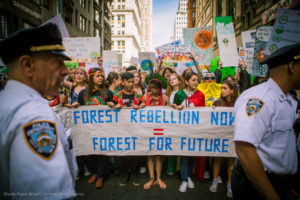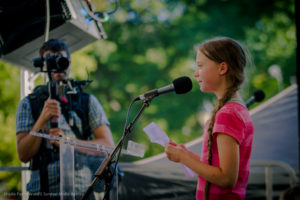
In New York, youth lead a march and strike for climate action to demand world leaders take meaningful steps to address this crisis with the urgency it requires just three days before the UN Climate Summit in NYC.
“Right now we are the ones who are making a difference. If no one else will take action, then we will,” said 16-year-old Swede Greta Thunberg, who participated in the strike in New York City. Thunberg also addressed the UN Climate Summit the following Monday.
Unlike warfare and images of climate struggles that are only sometimes effective in getting attention, Thunberg focuses on something that much more obviously relates to everyday life and the dangers to it: Not only is our house on fire, but the fire department has vanished.

In New York, youth lead a march and strike for climate action to demand world leaders take meaningful steps to address this crisis with the urgency it requires just three days before the UN Climate Summit in NYC.
In McKibben’s 2050, New York City remains, fortified by expensive seawalls and pumps. Many on the eastern coast of the United States have relocated further inland. Cities, though more crowded, are vibrant, thanks to free public transit, banned private vehicles and a civic fleet of self driving cars.
The defiant notion that we would forever overcome nature has given way to pride of a different kind: increasingly we celebrate our ability to bend without breaking, to adapt as gracefully as possible to a natural world whose temper we’ve come to respect. When we look back to the start of the century we are, of course, angry that people did so little to slow the great heating: if we’d acknowledged climate change in earnest a decade or two earlier, we might have shaved a degree off the temperature, and a degree is measured in great pain and peril.
